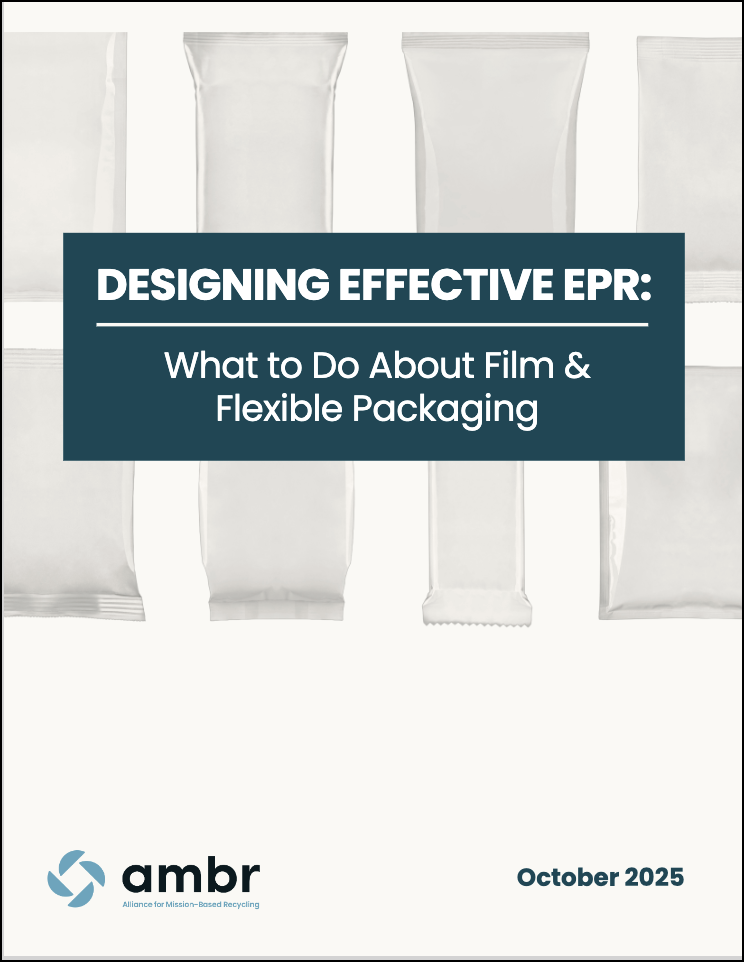National Recycling Alliance Warns Against New Efforts to Put Plastic Bags, Pouches & Wrappers in Curbside Recycling
A new report is now available from the Alliance for Mission-Based Recycling (AMBR), of which Eco-Cycle is a founding member. Read on to learn key takeaways—including stats, policy recommendations, and more—and get the download.

(Minneapolis, MN — October 3, 2025) On Friday, the Alliance for Mission-Based Recycling (AMBR) released a new report, “Designing Effective EPR: What to Do About Film & Flexible Packaging,” highlighting the significant problems associated with including flexible and film plastics in curbside recycling programs.
Flexible packaging, from grocery bags and shipping mailers to chip bags and stand-up zip-top pouches, is one of the fastest-growing types of packaging in the US. But these materials create significant problems for municipal recycling programs.
With many states implementing or considering Extended Producer Responsibility (EPR) policies for packaging and paper that include recycling targets, top consumer brands are investing heavily in efforts to make this packaging seem recyclable. But what recycling operators have known for decades is that flexible and film plastics cannot be recycled on a large scale. We must pivot to real solutions.
Most flexible and film plastics cannot be effectively recycled through curbside programs due to the complex material composition and limited end markets. The end markets that do exist stretch the definition of recycling and raise environmental concerns. Current markets include plastic-to-fuel, road construction, burning in cement kilns, and use in aggregate, filler, or drainage systems.
Additionally, when the material is included in single-stream curbside recycling, it creates costly contamination of paper streams, as well as delays and damage to recycling facility operations.
While flexible and film packaging has grown to account for as much as 50% of food packaging, it is estimated that US households generate more than 10 billion pounds annually, and only 2% of it is currently recycled, mostly through dedicated drop-off programs for clean, single-material films.
AMBR’s report provides guidance for states implementing EPR laws on how to ensure that recycling systems are not undermined, instead focusing Producer Responsibility efforts where they can have the greatest environmental and economic impact.
The report urges that as states pass EPR for packaging, they:
- Exclude flexible films from curbside programs to avoid costly contamination and equipment disruptions.
- Prioritize source reduction, reuse systems, and certified compostable alternatives.
- Require detailed producer reporting and adopt environmentally responsible end market standards.
- Ban counting incineration or fuel conversion as recycling and prohibit plastic recycling credit schemes for recycled content claims.
Download the full report here: Designing Effective EPR: What to Do About Film & Flexible Packaging
The Alliance for Mission-Based Recycling (AMBR) is a coalition founded by four of the original pioneers of mission-driven, community-based nonprofit recycling in the U.S., Eureka Recycling, Eco-Cycle, Ecology Center, and Recycle Ann Arbor. By revealing facts and myths about how recycling works, modeling innovative policies and practices, and influencing the national conversation, AMBR is guiding new recycling policies and infrastructure investments to rebuild credible, transparent recycling systems that support a sustainable circular economy and just, resilient local communities. For more information, visit ambr-recyclers.org.




























